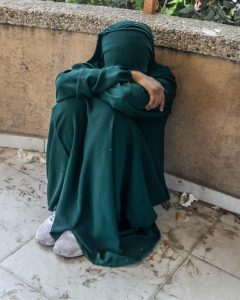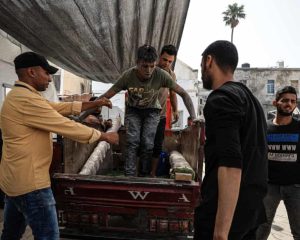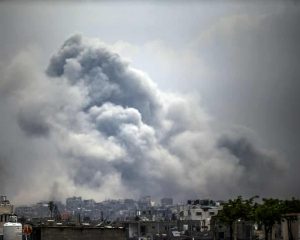At least 146 Palestinians have been killed in the last 24 hours in Gaza, marking one of the deadliest escalations in the war since ceasefire talks collapsed in March. The intensified Israeli bombardment comes amid a near-total blockade on humanitarian aid, sparking international outrage and fears of a looming famine.
According to Palestinian health officials, more than 300 people have died since Thursday due to Israeli airstrikes. The director of the Indonesian Hospital in northern Gaza, Dr. Marwan al-Sultan, described the situation as “catastrophic,” reporting dozens of victims still trapped under the rubble. “Since midnight, we have received 58 martyrs,” he said early Saturday.
The sharp increase in casualties follows Israel’s launch of Operation Gideon’s Chariots, a large-scale military offensive aimed at regaining “operational control” over parts of Gaza. Israeli officials say the campaign is intended to pressure Hamas into releasing hostages taken during the October 2023 attacks, which left approximately 1,200 Israelis dead. Hamas is believed to still be holding 57 of the 250 hostages.
UN human rights chief Volker Türk condemned the bombardment, stating the attacks and continued blockade amounted to ethnic cleansing. “This latest barrage of bombs … and the denial of humanitarian assistance underline that there appears to be a push for a permanent demographic shift in Gaza that is in defiance of international law,” Türk said Friday.
UN Secretary-General António Guterres echoed Türk’s comments during a speech at the Arab League summit in Baghdad, calling for an immediate and permanent ceasefire.
Meanwhile, U.S. President Donald Trump concluded a four-day visit to the Gulf, during which Saudi Arabia, the UAE, and Qatar pledged billions in investments in the United States. Hopes that Trump’s presence might reinvigorate peace efforts were dashed after he proposed turning Gaza into a “freedom zone,” a controversial suggestion interpreted as a U.S. takeover plan.
Back in Gaza, the humanitarian situation has deteriorated rapidly. Since Israel’s full aid blockade began on March 2, children in Gaza have faced soaring malnutrition rates. Medical care remains scarce due to supply shortages and repeated strikes on health facilities. UN aid chief Tom Fletcher warned of an impending famine during a Security Council address, stating, “We can save hundreds of thousands of survivors… if aid is allowed in.”
Israel has defended the blockade, accusing Hamas of diverting humanitarian aid for military purposes. It has proposed a new distribution plan involving private contractors under Israeli military protection. The U.S.-backed initiative, known as the Gaza Humanitarian Foundation, is expected to begin operations by month’s end.
However, international aid groups have strongly criticized the plan, calling it impractical and potentially illegal. They argue it could lead to forced displacement and urge Israel to lift the blockade and restore aid coordination through established humanitarian agencies such as the UN.
In response to the escalating crisis, Arab League ministers at the Baghdad summit pledged $40 million toward the reconstruction of Gaza and Lebanon. Iraqi Foreign Minister Fuad Hussein emphasized the need for regional-led rebuilding efforts, distancing the bloc from Trump’s proposed interventionist agenda.
A potential breakthrough may still be on the horizon. Hamas confirmed on Saturday that new ceasefire negotiations with Israel are underway in Doha, Qatar. A senior Hamas official, Taher al-Nono, told Reuters that discussions were ongoing without preconditions.
Since the beginning of the conflict in October, over 53,000 Palestinians have been killed in Gaza, according to local health authorities. As the war rages on, the death toll continues to climb, and international pressure mounts for a ceasefire to prevent further humanitarian catastrophe.






